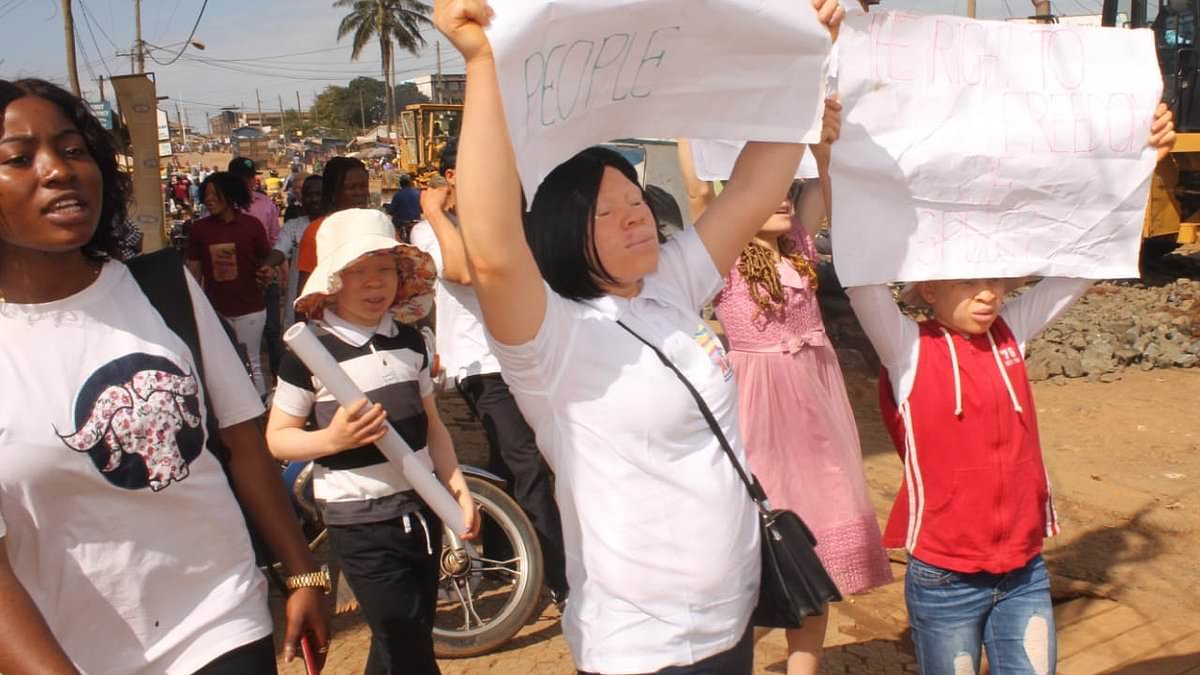People with albinism in sub-Saharan Africa already face the deadly threat of the sun, described by many as their ‘biggest enemy’.
Their skin lacks the melanin which is crucial to protect them from its ultraviolet rays, making them highly vulnerable to cancer.
More than 90 per cent of people with albinism on the continent – where roughly one out of every 5,000 people is born with the condition – die before they reach the age of 40, and the sun plays a large part in this.
But there are other ‘enemies’ which threaten their very survival – namely people’s prejudices, superstitions and the witchdoctors and depraved merchants who hunt them for their body parts.
In Cameroon, the belief that people with albinism bring luck or have magical powers has persisted for decades, and has devastating consequences.
Women and girls with albinism experience ritual rape, due to the disturbingly widespread belief that sexual intercourse with a person with albinism brings luck and cures diseases, including HIV.
Men, women and children have their limbs hacked off and are murdered, while dead people are exhumed by greedy traffickers who sell their body parts, charging between $2,000 for a limb to $75,000 for a ‘complete set’ – a whole body.
The violent atrocities Cameroonians with albinism are exposed to are overlooked by their government, campaigners say, forcing them to advocate on their own behalf and try to educate the population themselves.
Madame Ngom Maceline is the founder and executive director of the Association for the Welfare of Albinos, a charity based in the northwestern city of Bamenda.
Started in 2016, the association works tirelessly to educate and empower people with albinism, as well as protect them from vile attacks by fellow villagers.
It also seeks to promote understanding in communities, as it takes on the mammoth task of changing people’s attitudes and safeguard people with albinism in doing so.
‘Persons with albinism are not considered ‘normal’,’ said Maceline, who has the condition herself.
‘In that way, they are always left behind. They don’t have any belongings, they don’t receive direct support from the government.’
Backwards attitudes in communities mean that they are often considered to be ‘cursed,’ or become objects for witchcraft.
‘You have people that use their hairs for wealth,’ Maceline said. ‘They say that when you have the hairs of a person with albinism, especially women’s, it empowers you to get riches.’
She added that there is an ‘ongoing crisis’ in her region and that she is currently dealing with several cases of albino women who have been raped.
‘Some people consider that when you “make love” with a person with albinism they will cure HIV and AIDs.
‘There are many cases in our community where you see women with albinism not getting married, but with numerous children.’
When women give birth to children with albinism, Maceline said, they are ‘cleaned’ by their communities, either by being washed in a river or forced to walk around a tree over and over again, she said.
Newborns with albinism are often even killed immediately after they are delivered, then falsely reported as stillborn, according to a UN report.
Those who do survive are treated as outcasts by the community, and can be driven out and shunned.
Children are refused an education, meaning many grow up illiterate with limited skills.
Adults are denied jobs, and when they do get employment, rarely receive equal pay to people with pigmented skin.
Maceline, who is a trained nurse, said she faced discrimination as she tried to get into work, with people wrongly saying she was incapable due to albinos often having poor eyesight.
She is now on the frontline of dealing with the scourge of skin cancer in her region, which often goes untreated due to lack of funds and government support.
Maceline says that among the 300 people with albinism in her area, more than 100 are suffering with cancer, with one person dying just a few days ago.
She added that they also have to contest with ongoing conflicts between militia groups and the state in her region, which she said ‘affects persons with albinism the most’, because they are so conspicuous among people with dark skin.
It also means a lack of aid and support being able to reach them in rural areas.
But, thanks to the tireless work of Maceline and others, hope has been instilled in her small community.
Youngsters are educated from a young age to apply sun cream, wear clothes and hats that cover their skin, and avoid the sunlight when they can.
They receive an education, and take part in workshops for public speaking, hairdressing and craftwork.
Maceline and her team help to give them the skills to get into work, and create wares to sell and earn money for their families.
Her campaigning has seen her speak to government ministers, work with the UN, and go on local radio in the hope of changing attitudes towards albino people across Cameroon.
Men, women and children with albinism, ostracised in their communities, are at last made to feel welcome.
They are given the chance to have fun, singing and dancing, taking part in beauty pageants and talent shows, and their joy and resilience shine through in pictures shared by the AWA.
They are given a brighter future thanks to the work the charity does. If you would like to donate to support them, the link is here.
Albinism is a genetic condition which causes a lack of pigmentation in the skin, eyes and hair.
It is thought to affect around one in 20,000 births worldwide, and one in every 5,000 in sub-Saharan Africa.
It causes serious eyesight problems such as photophobia, strabismus, myopia and nystagmus (involuntary eye movements).
An albino person’s skin has little or no melanin, which is a very effective blocker of solar radiation, and this makes them extremely vulnerable to the harsh effects of the sun.
